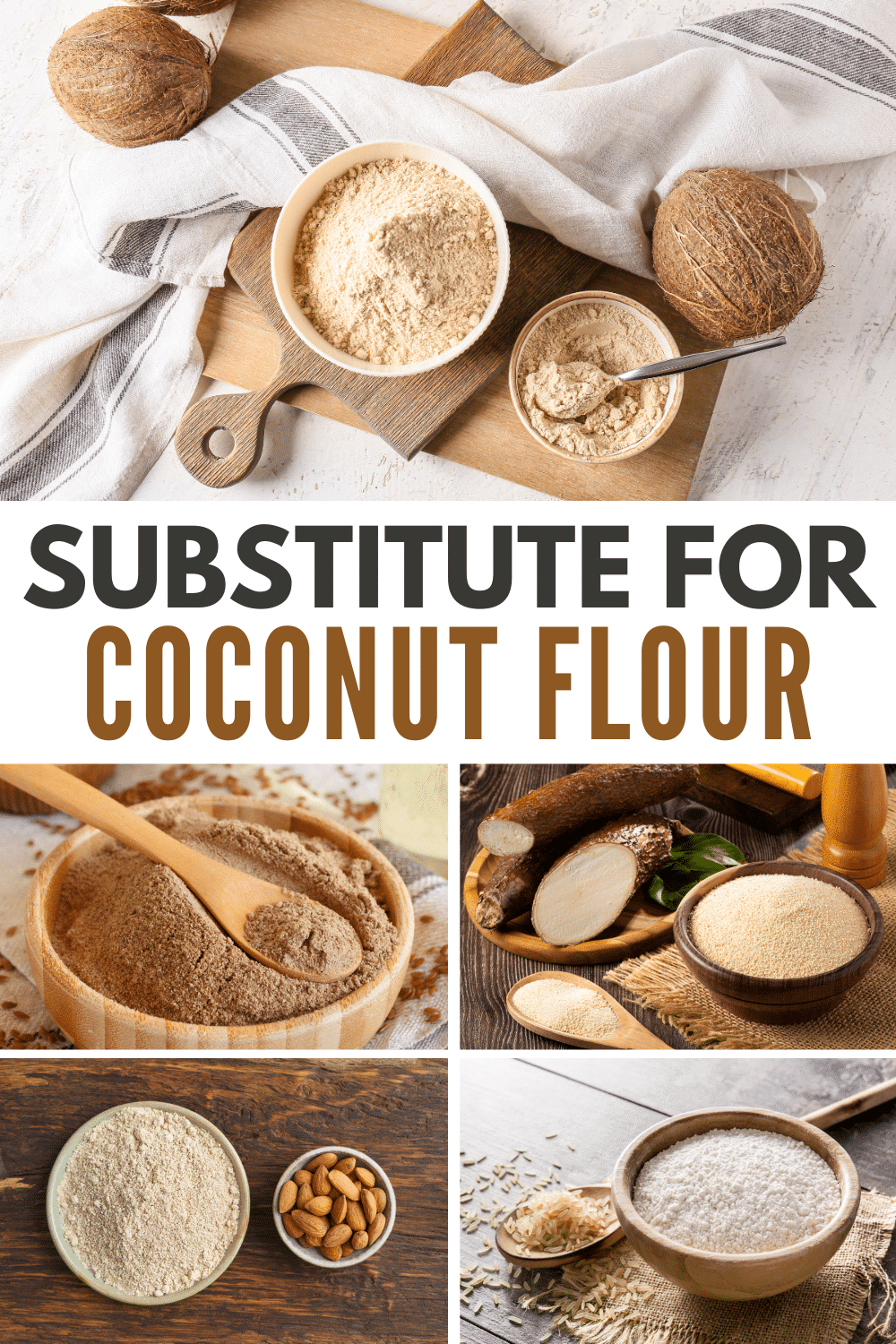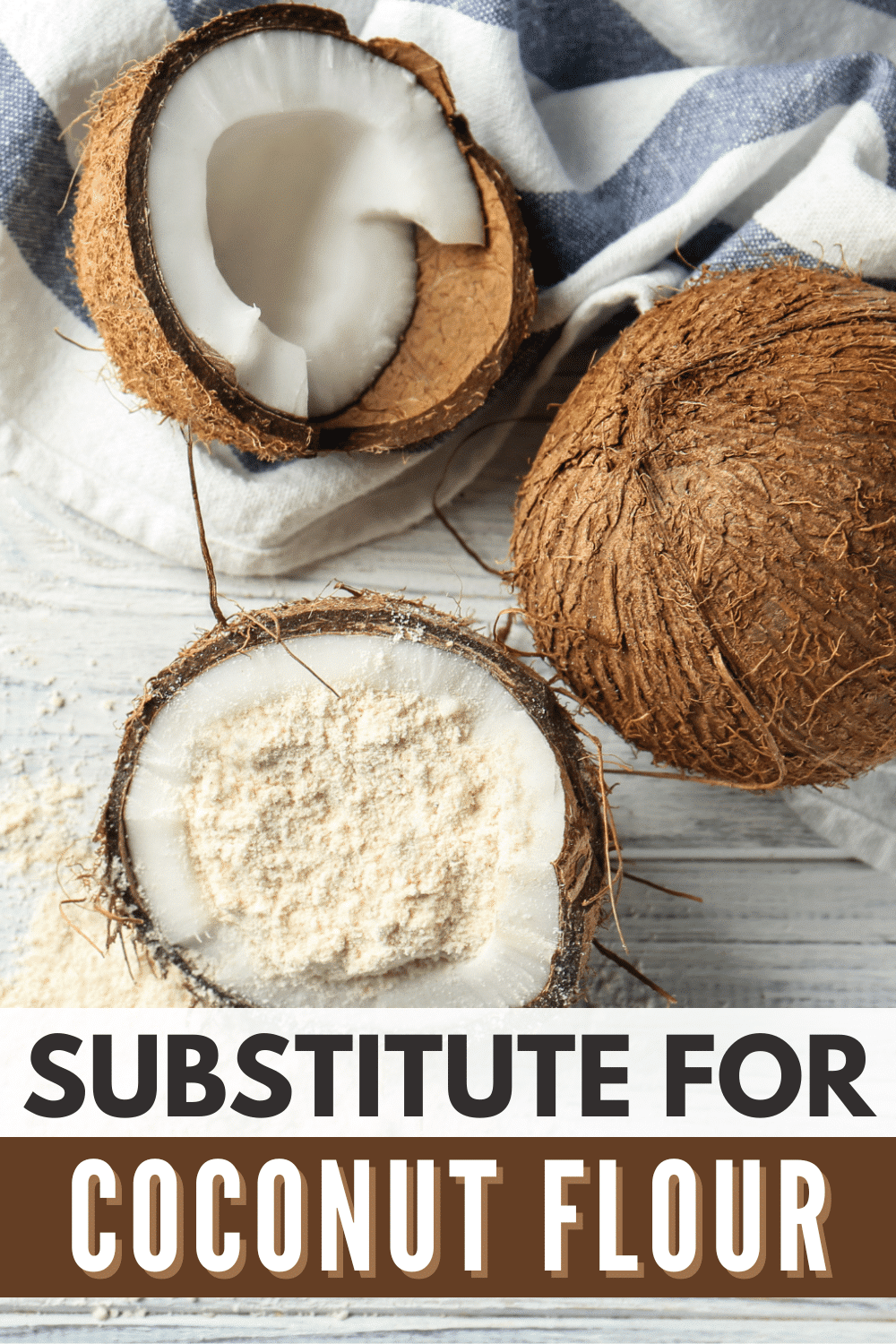Knowing the best substitute for coconut flour is definitely a lifesaver, especially if you love baking! People have been raving about coconut flour as a gluten-free option, making it a popular ingredient.
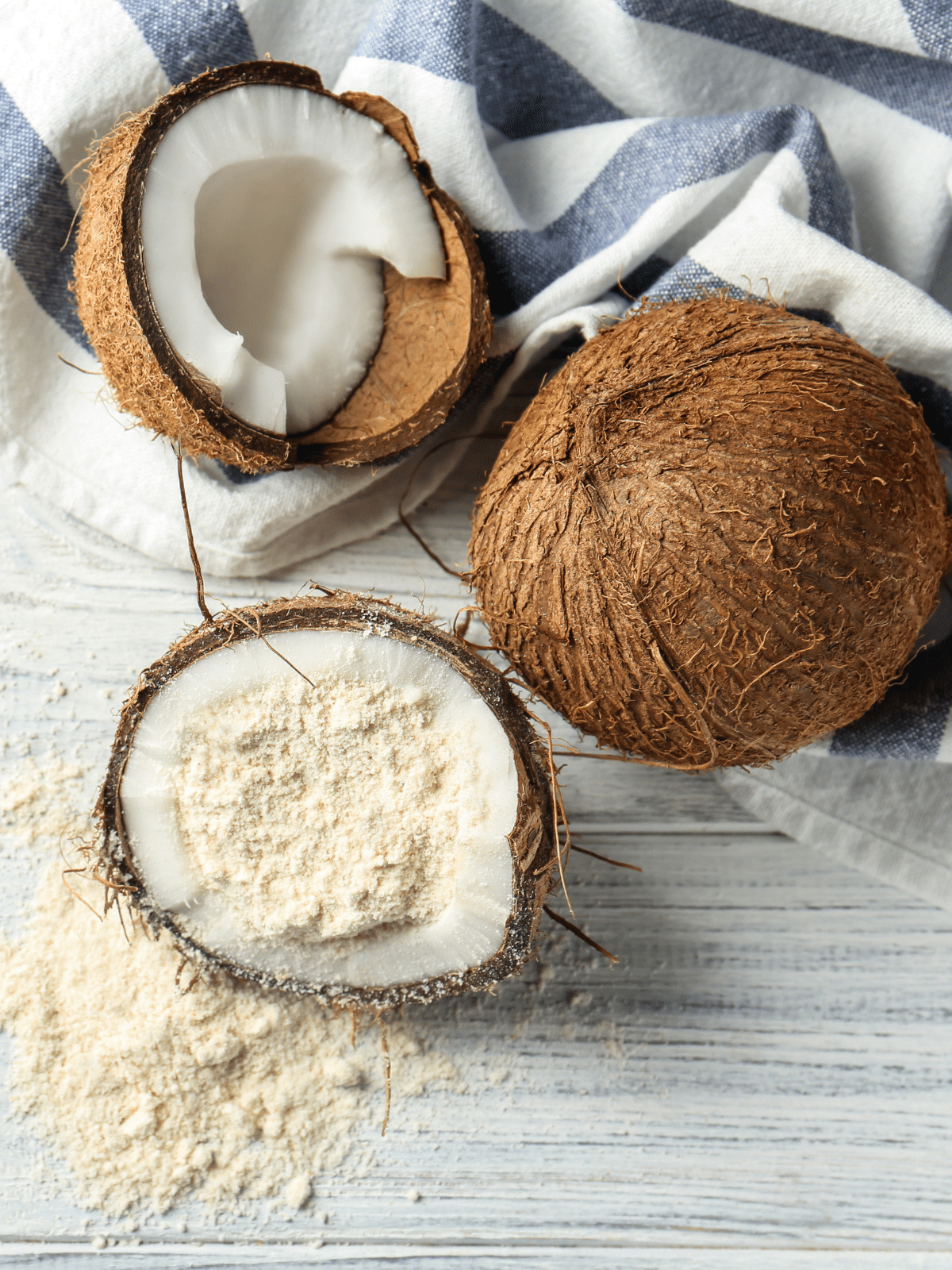
Besides being a safe bet for people with gluten sensitivities and allergies, this amazing baking must-have also provides a delightful, unique, and natural sweetness to any pastry or baked good.
Yes, coconut flour has become popular throughout the years, but sometimes you can’t find or use it. Whether it’s because it’s out of stock or the people you’re baking for have coconut allergies, you may have to find an alternative.
To help you, I’m sharing a list below of some of the best coconut flour substitutes you can easily get your hands on!
Jump to:
What Is Coconut Flour?
Coconut flour is made from dried, ground coconut meat. It’s usually white or off-white and coarser than wheat flour, and can be found in the grocery isles.
It’s commonly used as a substitute for wheat flour since it’s gluten-free and has low carbohydrates. However, people have also started to love coconut flour for its unique flavor and texture.
I’ve noticed that coconut flour drinks up a lot of moisture. It’s more absorbent compared to most other flours in the market, so a little goes a long way. Since coconut flour is coarser than regular wheat flour, expect your baked goods to have a coarser and slightly grittier texture as well.
The Benefits of Using Coconut Flour
Coconut flour is a great baking ingredient and not just a wheat flour alternative. It has several health benefits that many of us can benefit from.
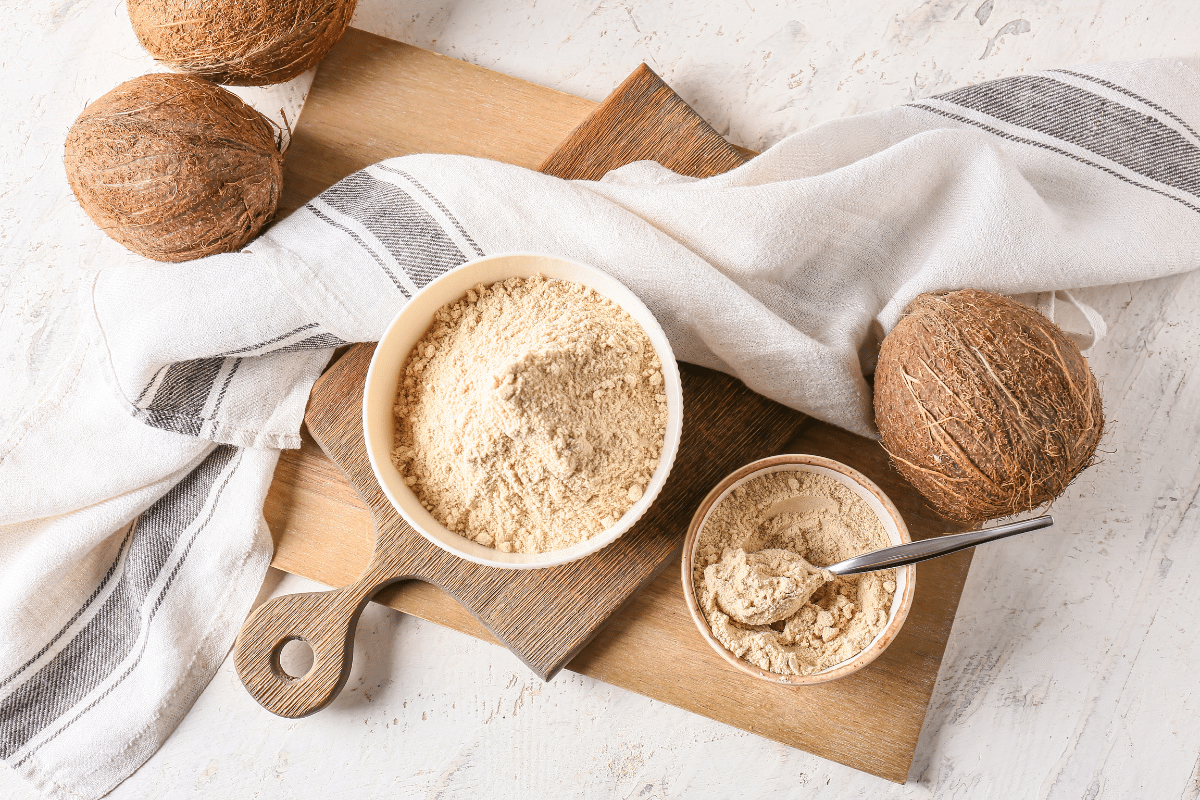
Here are just some of the reasons to use coconut flour:
- As previously mentioned, coconut flour is naturally gluten-free. So, it’s one of the top ingredients used by people suffering from gluten allergies and celiac disease,
- Coconut flour is higher in protein, fiber, and fat than regular flour and has lower carb content. These nutrients help satisfy cravings and aid in weight loss, making it popular for people on a low-carb diet like paleo, keto, and Atkins.
- Compared to many types of flour, coconut flour also has a relatively low glycemic index score. This makes it a suitable ingredient for people with insulin resistance and diabetes.
- Coconut flour is nutrient dense. It’s known to be rich in the following nutrients:
- Iron
- Manganese
- Phosphorus
- Potassium
- Selenium
- Vitamin B6
Why Look for Coconut Flour Alternatives?
Coconut flour in baking is a delight. It’s a type of gluten-free flour that’s both reliable and tasty. From tasty breakfast muffins to gluten-free dinner bread, coconut flour can easily take wheat flour’s place.
But even though it’s an amazing ingredient, not all of us can have it all the time. Here are some reasons why you may need to look for coconut flour alternatives:
Availability
Since coconut flour has grown in popularity, its accessibility has improved. But due to several logistical reasons, it might not be available, and you’ll need to find a stand-in instead.
You can choose from many substitutes if you’re out of coconut flour. It may be out of stock, or the shipment has been delayed, and you can’t find it anywhere. Alternatively, it may be out of your budget and you need more affordable options.
In such cases, you may find it best to look for substitutes instead.
Allergies and Food Sensitivities
While coconut sensitivities are rare, it’s not completely impossible to be allergic to coconut. While some cases of allergies are mild, there still exists a risk of a grave anaphylactic reaction that can lead people to the hospital.
On top of that, people sensitive to a specific fiber found in coconut flour may experience bad digestive symptoms.
As such, many people skip using coconut flour and look for replacements.
Preferences
You may love coconut and the natural, but unique sweetness and texture coconut flour can add to a baked good. But not everyone does, which doesn’t mean they have to miss out on some amazing recipes.
If you don’t like coconut flour’s taste or gritty texture, feel free to look for replacements that can satisfy your taste buds!
5 Best Coconut Flour Substitutes
Almond flour
Versatile and packed with fiber and protein, almond flour is one of the top alternatives to coconut flour. You can use almond flour in place of coconut for a gluten-free recipe.
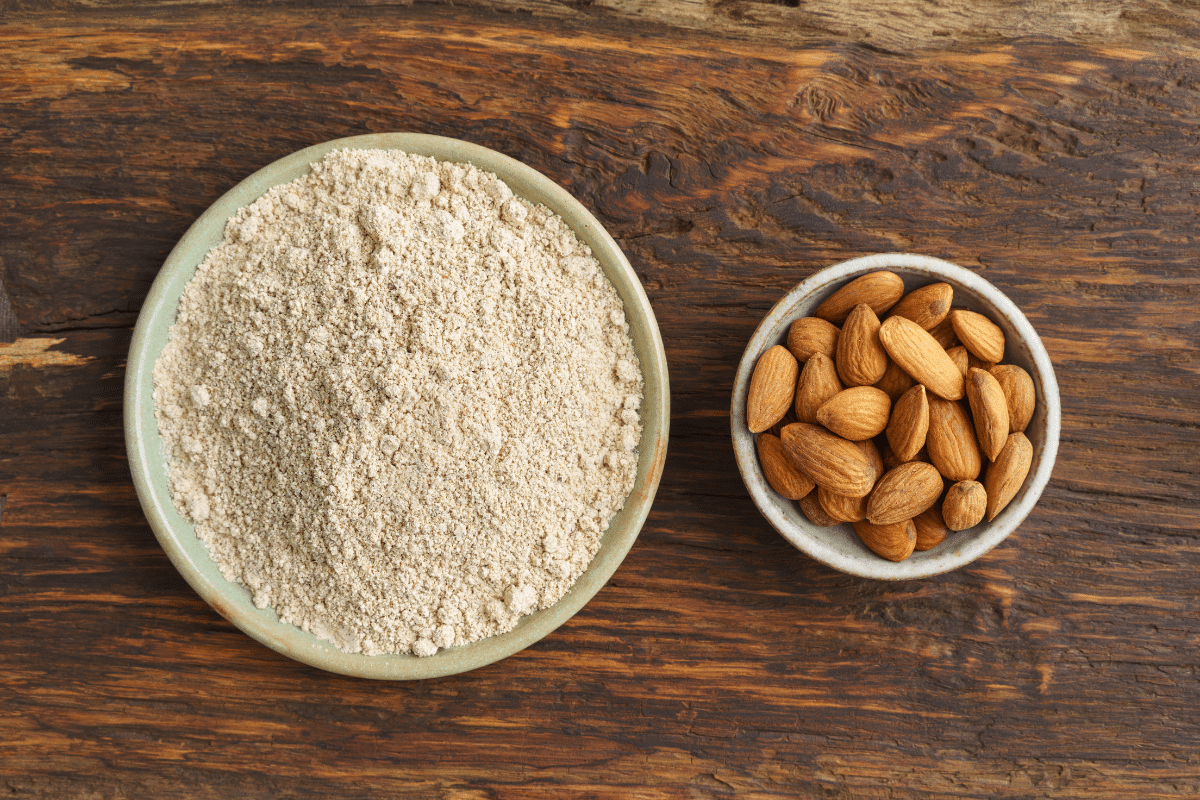
When using almond flour, though, expect a nuttier flavor than coconut. Also, note that almond flour is higher in fat and calories than coconut flour.
To substitute almond flour for coconut flour, use two cups of almond flour if the recipe calls for one cup of coconut flour.
Cassava flour
In place of coconut flour, using cassava flour in recipes as a gluten-free option is another thing you can do. To make this flour, manufacturers grind the entire root of the cassava plant.
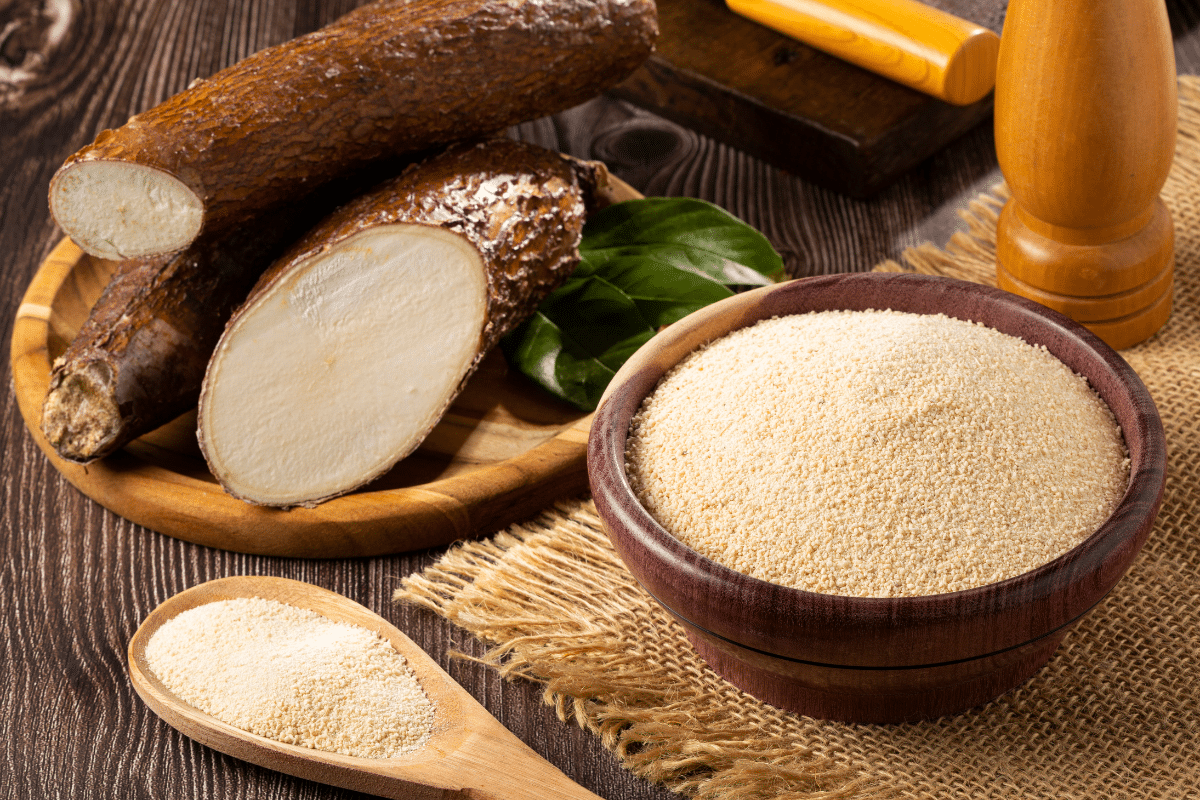
Like coconut, this flour is high in fiber and also contains many nutrients. Cassava flour is also a good addition to many grain-free, nutritional diets. However, the texture you get from cassava flour is finer than coconut flour’s coarse, gritty texture.
To use this as a substitute, you will need to quadruple the amount of coconut flour needed. So, use 1 cup of cassava flour for every 1/4 cup of coconut flour.
Tapioca flour
Cassava flour isn’t the only baking ingredient that comes from a cassava plant. Tapioca flour is another type that comes from the cassava plant. However, tapioca only uses the starchy part of the root, so it has less fiber.
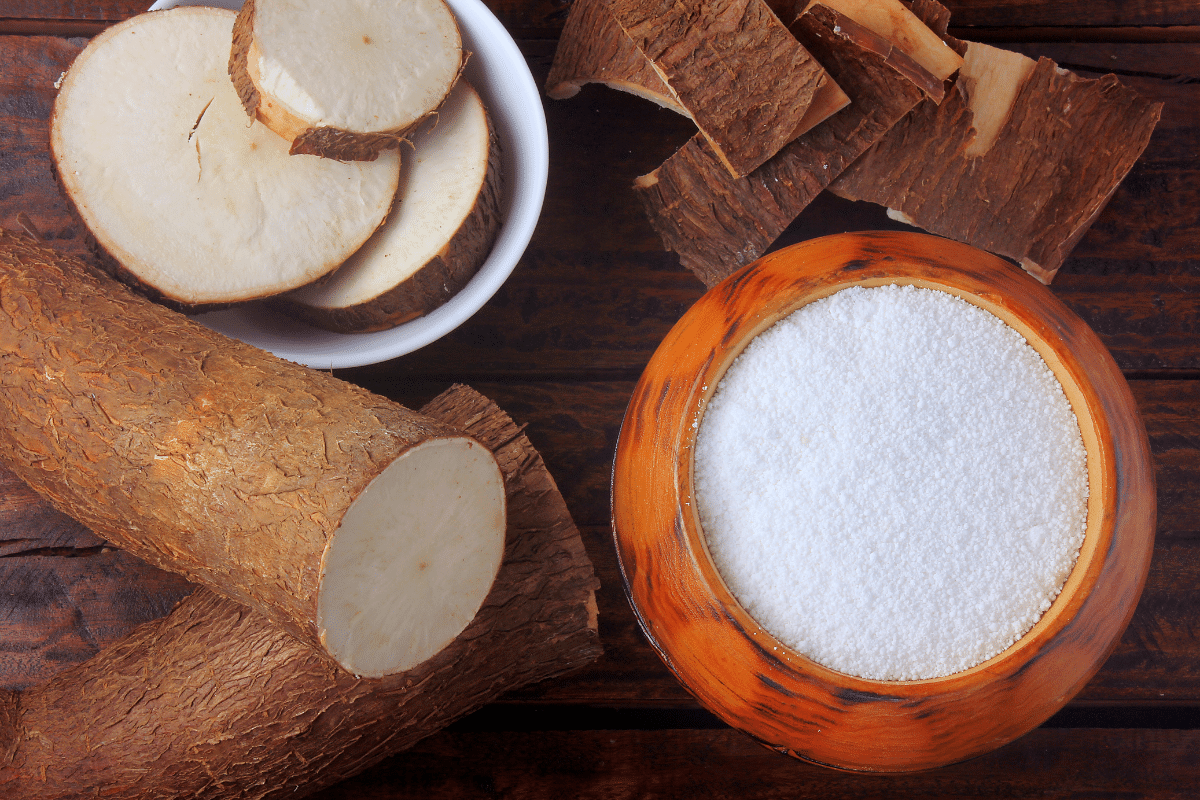
You’ll find that tapioca flour has a more neutral taste compared to coconut flour and cassava flour. This is fantastic because it won’t affect the flavor of your baked treats too much when you make the swap.
It is an incredible gluten-free coconut flour alternative. It’s quite versatile because you can even use it as a soup and sauce thickener thanks to its rich starch content.
So, if you want tapioca flour instead of coconut flour, you can substitute it using a 1:1 ratio.
Flax Meal
Flax meal is a baking and cooking ingredient made from ground-up flax seeds, and it’s definitely a great replacement for coconut flour.
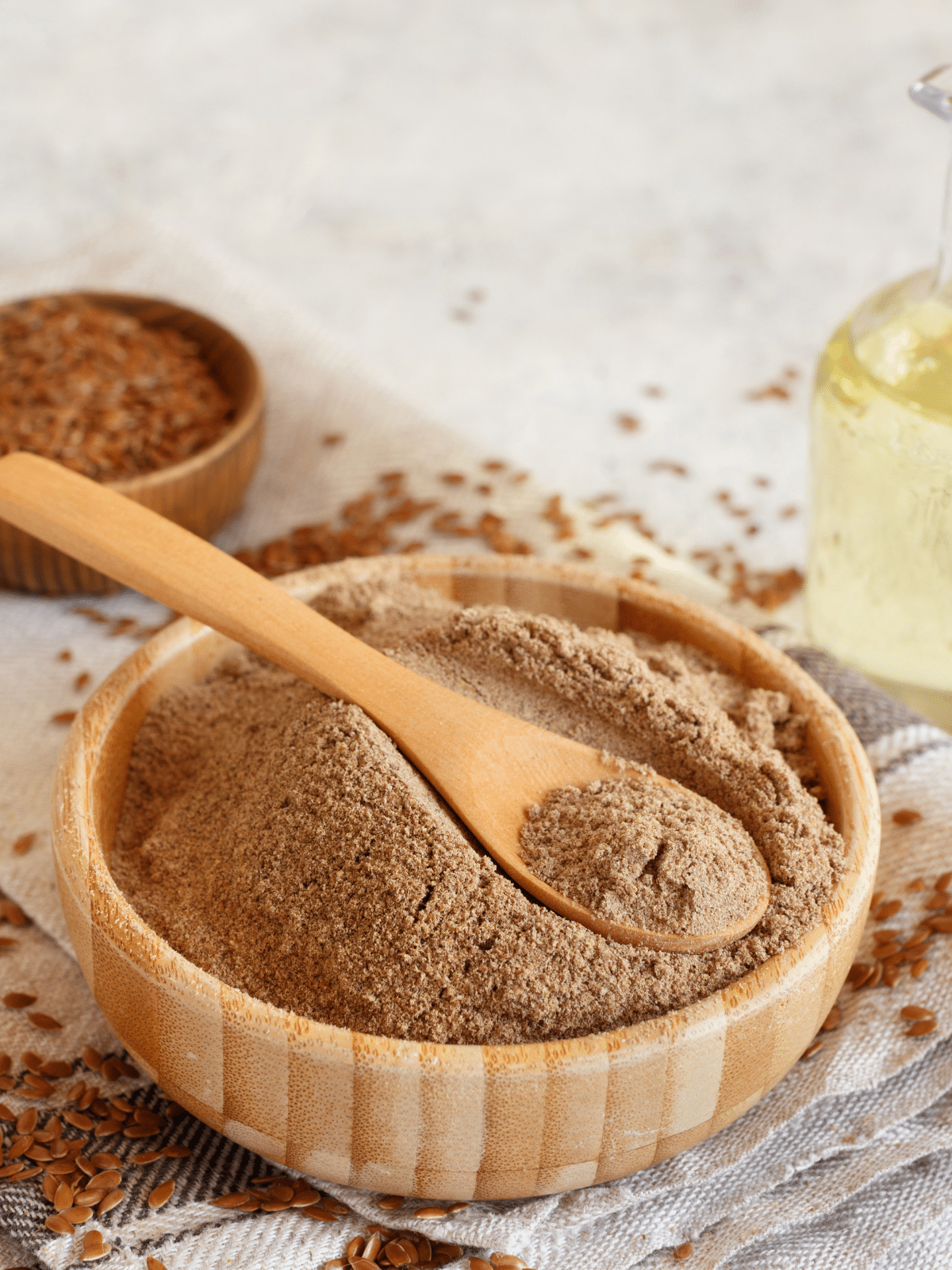
Like coconut flour, flax meal is an incredible gluten-free option for baked goods. It also shares the same moisture-absorbing properties and grainy texture that you get from coconut flour.
However, unlike coconut flour, flax meal has a nutty taste. It’s also even lower in calorie content compared to coconut flour.
To use flax meal instead of coconut flour, use three times the amount of flax meal you would use coconut flour. For example, if the recipe calls for 1/3 cup coconut flour, you would use 1 cup of flax meal.
Rice Flour
White rice flour is another great option for a neutral-tasting coconut flour substitution. On the other hand, brown rice flour may have a slightly nutty flavor to it. Like coconut flour, white and brown rice are amazing gluten-free options for your recipe.
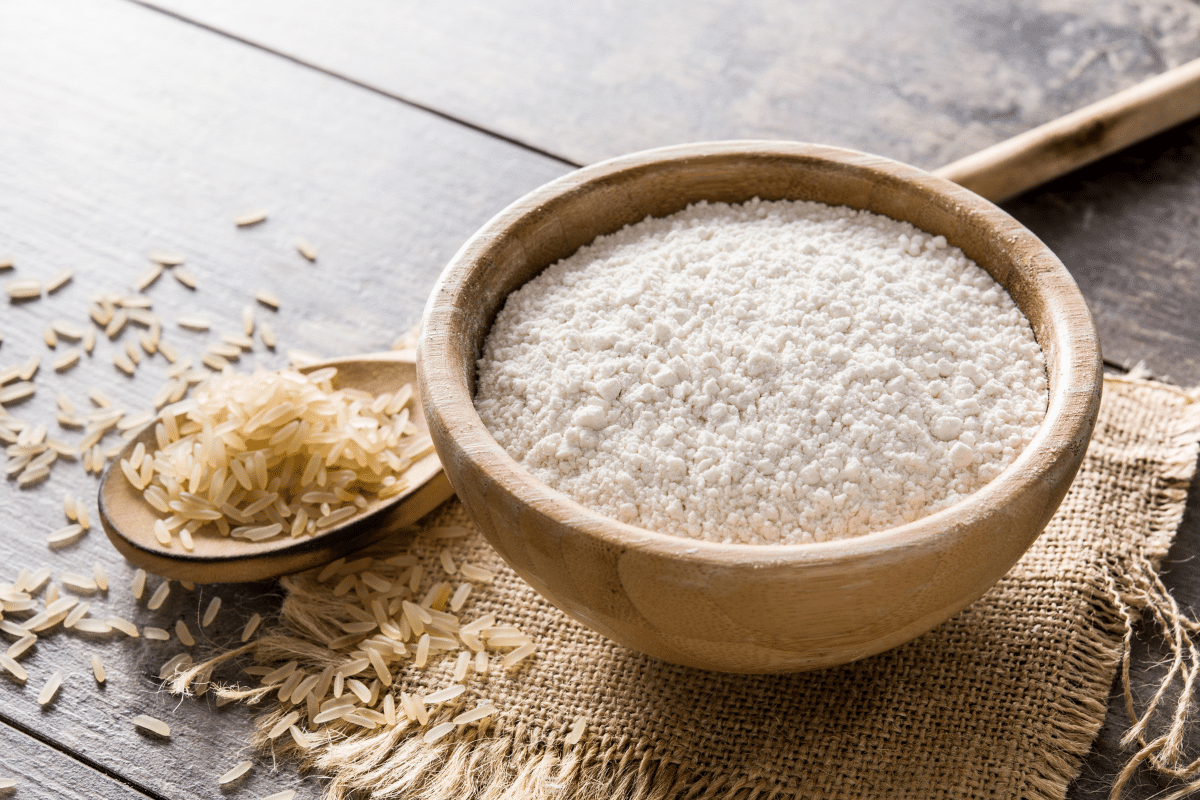
Like many coconut flour alternatives, you may find rice flour less dense and powdery than coconut flour. As such, expect a different texture when using this stand-in.
To substitute, you can use the amount of rice flour thrice to substitute 1 part of coconut flour in recipes. Also, do note that while rice flour can absorb more moisture than other flour types, coconut flour is still more absorbent, so adjust your moisture content depending on the need.
Tips on Using Substitutes for Coconut Flour

- Adjust the moisture content. You may notice that some of these alternatives soak up moisture more than others. Depending on the need, it’s best to add or reduce the moisture content.
- Instead of using water to add moisture, use eggs or milk (depending on the recipe). This makes your pastry more flavorful.
- Sift your flour if you’re using a coarser type. For a smoother texture, I like to pass the coconut flour through a sifter before mixing it with my wet ingredients.
FAQs
You certainly can. However, do know that all-purpose flour is made from wheat. It has gluten and more carbohydrates, so it may not be good if you have a diet that avoids them.
If not, and you want to use AP flour instead of coconut flour, you can swap 1/4 cup of coconut flour for 1 cup of regular flour.
Yes, diabetes patients and those with insulin resistance can use coconut flour. Apart from being low-calorie, it also has a low glycemic index, so it shouldn’t raise your blood sugar levels.
Aside from people with coconut allergies, people with IBS or inulin sensitivity should also avoid coconut flour.
Inulin is a type of fiber that coconut flour contains, and if consumed in large quantities, it can result in bloating and bad digestive symptoms.
Finding Healthy Substitutes for Coconut Flour
Using another type of ingredient is not the end-all, be-all of baking recipes. While I agree that baking is a science, I still find that it’s more lenient than what people make it out to be.
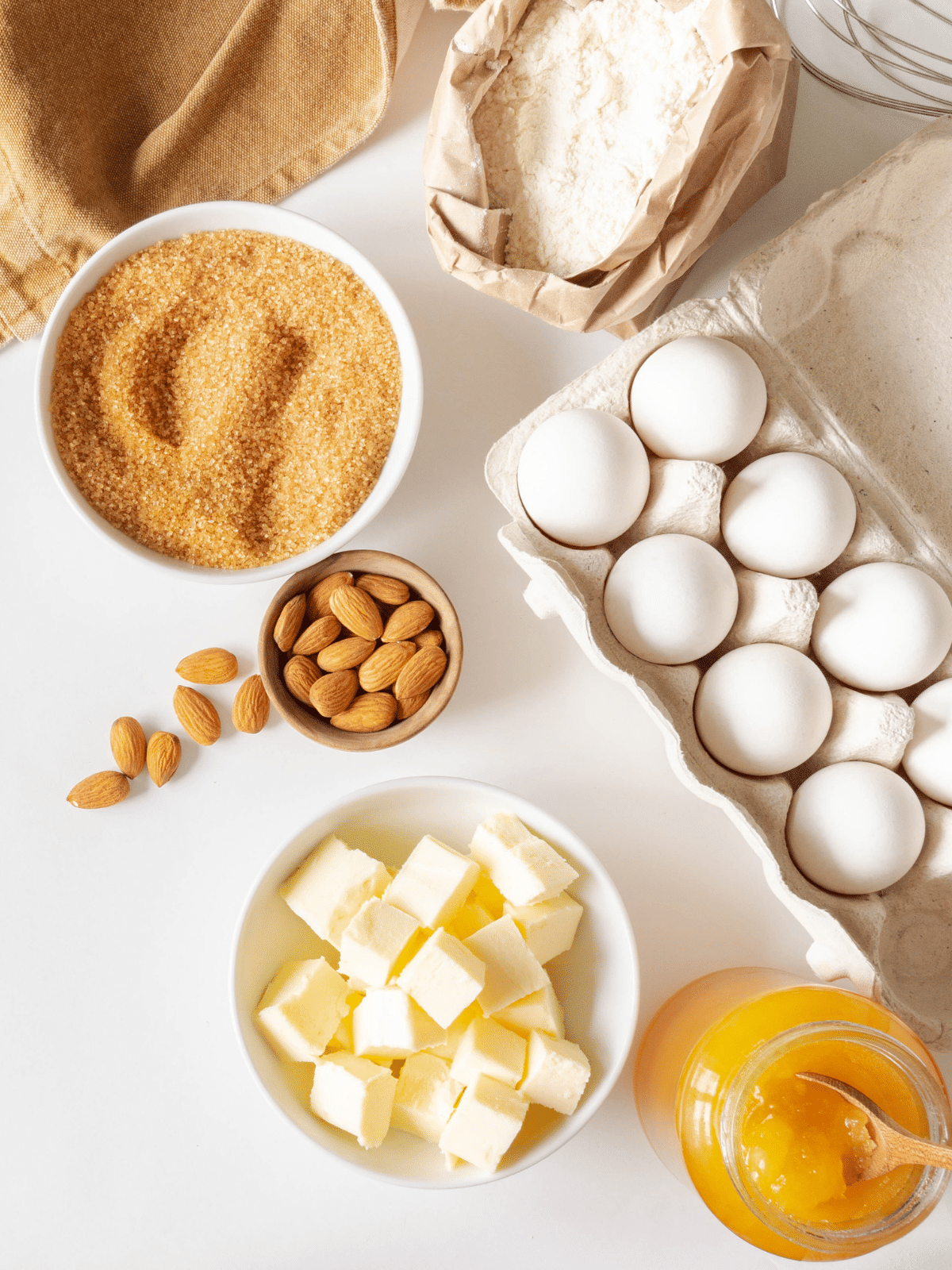
Substitutions are very welcome, and they can work wonders for a recipe. You may even find an ingredient you’d prefer more than the one the recipe calls for.
So, if you have to replace coconut flour for one reason or another, don’t hesitate to grab one of these substitutes and use it in your recipe.

